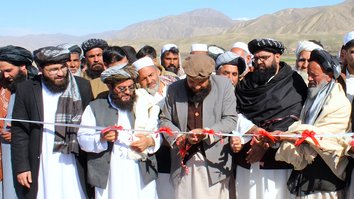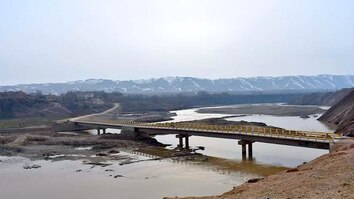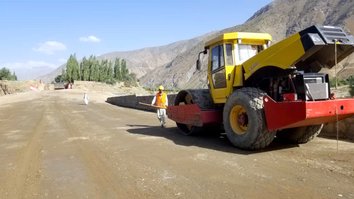KUNDUZ -- The Taliban have yet again inflicted hardship and misery on Afghan civilians.
The Taliban on September 16 blew up the Abqul Bridge, a key 15-meter-long and 5-meter-wide overpass that connected Baghlan-e-Markazi District, Baghlan Province, to Pul-i-Khumri, the provincial capital.
The destruction of the bridge has added to the woes of local residents, cutting off their access to local villages, hospitals and markets and creating large traffic delays.
The Taliban committed the sabotage at night, which enabled them to avoid detection by Afghan troops, according to Shamsuddin Seddiqi, a resident of Mangalha village in Baghlan-e-Markazi.
![Children watch Afghan National Army (ANA) soldiers in Baghlan Province March 15, 2016. The Taliban's destruction of a bridge in the province this month has caused suffering for local residents. [Shah Marai/AFP]](/cnmi_st/images/2018/09/27/14699-000_8r8ef-585_329.jpg)
Children watch Afghan National Army (ANA) soldiers in Baghlan Province March 15, 2016. The Taliban's destruction of a bridge in the province this month has caused suffering for local residents. [Shah Marai/AFP]
"The main road connecting 30 villages to Pul-i-Khumri has been cut off," he told Salaam Times, describing the impact of the bridge's loss. Food shortages and difficulties transferring patients to healthcare facilities are hitting civilians hard, said Seddiqi.
The Taliban did not state what military gain they saw in severing the transport link. However, with the bridge now gone, troops in Pul-i-Khumri can no longer reach those 30 villages, unless they fly in.
"For God's sake, why do you [the Taliban] destroy a bridge? You have ruined our entire lives only to serve foreign objectives," exclaimed Seddiqi.
The militant group had previously tried to blow up the bridge but failed to do so at that time, Nematullah, a tribal elder from Baysqal village in Baghlan-e-Markazi, told Salaam Times.
Ruining public infrastructure
Afghan engineers are ready to rebuild the bridge if Afghan forces provide security, Mehrabuddin Ibrahimi, a spokesman for the Baghlan provincial department of the Ministry of Rural Rehabilitation and Development, told Salaam Times, confirming the bridge's demolition by the Taliban.
"Destruction or blockages of public infrastructure [including bridges] have a corrosive impact on the lives of the local population. Agricultural crops are not reaching local markets, and residents cannot transport the sick to hospitals," he said.
This is, however, not the first time that the Taliban have torn down bridges to block access to local towns and villages.
On August 20, 2016, the Taliban, in an attack on Kunduz city, blew up the Alchin Bridge. The bridge, situated in the north of town, linked four districts to the provincial capital, said Ghulam Rabbani Rabbani, a member of the Kunduz provincial council.
"The bridge was the only local transit route going through Sher Khan Bandar port, connecting Afghanistan to [Tajikistan] and the Central Asian countries," Rabbani told Salaam Times.
Afghan National Army engineers eventually rebuilt the span.
"Ruining public infrastructure is truly a crime against humanity," he added.
Since fighting broke out in April 2017 in Baghlan-e-Markazi, the Taliban have blown up at least 10 bridges of various sizes, according to local residents in the district. The destruction is making life a nightmare for civilians.
"The clashes continue in the district... [civilians] are bearing the brunt of the cost," Saifuddin Rahimi, 38, a resident of Baghlan-e-Markazi, told Salaam Times.
"Local farmers, for example, are not able to transport their agricultural products to market," Rahimi added.
Continued push against the Taliban
Afghan forces, supported by the Resolute Support mission, have been conducting Operation Walid 15 during much of September in Nahrin, Baghlan-e-Markazi and Dahna-i-Ghori districts, as well as in the Dand-e-Shahabuddin area, including highways.
As a result, more than 60 Taliban militants have been killed or injured, Gen. Ekramuddin Sari, Baghlan's provincial police chief, told Salaam Times September 16.
Afghan forces thwarted an attack orchestrated by the Taliban from all directions in Baghlan-e-Markazi district and in the Pul-e-Bashir Khan area September 16, killing dozens of Taliban militants, he said.
Four fighters from Taliban's Red Unit, the group's elite special forces unit, were among the dead, according to Sari.
"We will kill and eliminate them [militants] wherever they make a move [against public infrastructure]," he told Salaam Times.

![The Alchin Bridge, shown August 26, 2016, stood in Kunduz city. The Taliban blew up the bridge August 20, 2016, to stop Afghan forces from chasing them, according to local officials. [Hedayatullah]](/cnmi_st/images/2018/09/27/14680-_dsc0124-585_329.jpg)






